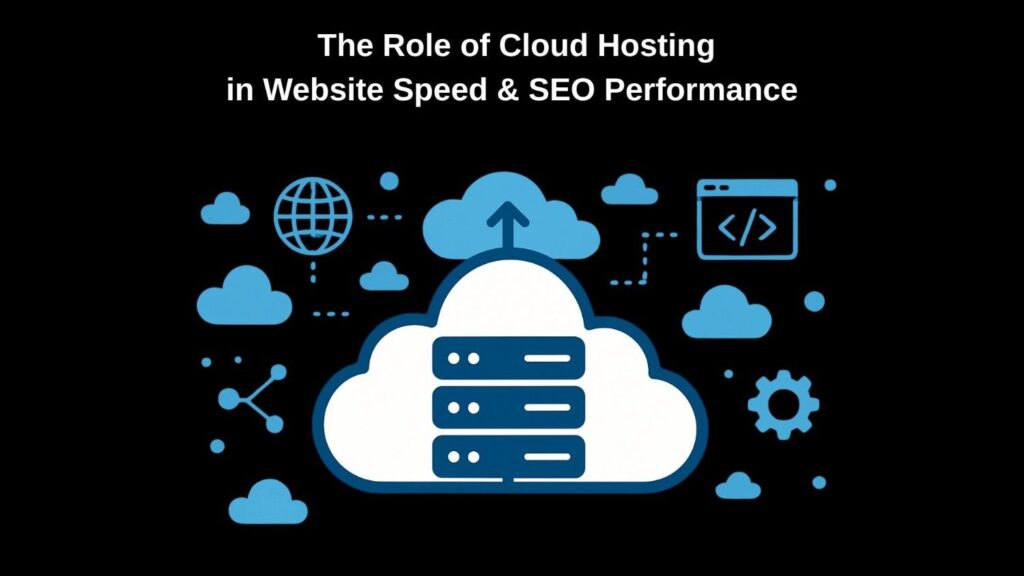Speed. It’s the one thing every internet user wants, regardless of the device they’re using, where they’re browsing from, or what they’re looking for. We expect websites to load in seconds, maybe less. If they don’t, we bounce. We forget. We move on.
Search engines are no different. Google’s algorithms have evolved to mimic user behavior more than ever before. Website speed has a direct impact on your SEO performance. A slow site can mean lower rankings, fewer visitors, and lost opportunities. However, while most SEO conversations still revolve around keywords, backlinks, or content strategies, one technical pillar often gets overlooked: hosting.
It might not be as flashy as a viral campaign or a clever blog, but it’s the foundation, often invisible, but essential, that determines how fast, stable, and secure your website feels. And all of those things? They directly influence your SEO. Let’s break down
What’s Cloud Hosting, and Why Should You Care?
Cloud hosting isn’t some mystical tech buzzword. Think of it as a modern upgrade to traditional hosting, except instead of relying on one single server, your site’s data is spread across multiple servers in different locations. That means better uptime, faster load speeds, and far less risk of a total crash when traffic spikes.
With the best cloud hosting services, you’re not renting space on one old machine; you’re plugging into a powerful, flexible network. And for SEO? That level of speed and stability makes all the difference
Faster Sites Rank Better, It’s Not Just a UX Thing
Here’s what many folks miss: speed isn’t just about giving your users a good experience. It’s a ranking factor in Google’s algorithm.
Cloud hosting gives your site the agility it needs. By storing and delivering content from data centers closest to your visitors’ location, cloud hosting reduces latency and trims those critical seconds off your load time.
Let’s face it, every second counts when it comes to user experience and retention. A delay of even 1 second can cause a 16% drop in customer satisfaction and up to a 7% loss in conversions. Now, consider what Google registers when users quickly leave your site, a clear signal that affects your rankings
Uptime Isn’t Just Technical Talk
Ever clicked on a site and hit a “Server not responding” error? Annoying, right? Now, imagine a Google crawler hitting your site during that exact window.
Cloud hosting virtually eliminates that risk. With redundancy built into the system, it ensures your site stays live even if one server fails. You get that 99.99% uptime guarantee that sounds like fluff, until it saves your SEO.
Local Delivery, Global Performance
If your customers are spread across continents, the old-school hosting setup just can’t keep up. A user in London shouldn’t have to wait for data to travel from a server in Mumbai. That’s just… slow.
With a cloud hosting service, your site’s files live on multiple global servers. Visitors are served from the closest location, so the experience feels fast and native, even if you’re halfway around the world.
This is especially important for e-Commerce, SaaS, or any brand with international aspirations. SEO isn’t just about appearing; it’s about appearing fast.
Are you enjoying reading this blog post?
If you’re interested in having our team handle your marketing needs, please click here
Built-In Security That Google (and Users) Appreciate
Security’s another big factor in the SEO equation, especially now that Google uses HTTPS as a ranking signal. But beyond that, cloud hosting often comes with firewalls, malware detection, DDoS protection, and other serious safeguards.
To be blunt, a single security breach can compromise your entire digital presence. Rankings nosedive, users disappear, and cleaning up the mess can take weeks, if not longer. The best cloud web hosting services actively protect you from that risk.
Scaling? Cloud Hosting Doesn’t Blink
Picture this: your brand goes viral. Traffic surges. Orders spike. But if your server can’t handle the load, your site crashes, and all that momentum vanishes in a blink.
Cloud hosting solves this with auto-scaling. It allocates more resources as traffic increases, without you having to do a thing. From an SEO standpoint, this means consistent speed and stability under pressure. Google sees a well-maintained site, and users experience zero friction.
It All Adds Up to Lower Bounce Rates
Google pays close attention to how users interact with your site. If people leave quickly because it’s slow, broken, or down, your bounce rate climbs, and your ranking falls.
By improving speed, uptime, and security, cloud hosting reduces those friction points. Users stay longer, engage more, and convert better. That positive engagement sends a strong signal to Google: this site is trustworthy, useful, and worth ranking.
Final Take: Hosting Isn’t Background Noise Anymore
We tend to think of hosting as just another tech box to check. But in reality, it’s part of your brand’s performance toolkit, just as important as content or design. Cloud hosting isn’t just “faster” hosting. It’s smarter, more reliable, and SEO-friendly in all the right ways.
At Magnarevo, we help businesses move beyond laggy, outdated infrastructure and onto cloud hosting platforms that fuel real growth. Whether you’re running a lean startup or a high-traffic marketplace, your website deserves a foundation that supports its potential.
About Author
Raised in India, I earned a Masters in Marketing from Swinburne University. Initially in Sales, I pivoted to Digital Media in 2013. Now, as the driving force behind Magnarevo, I leverage my expertise to guide branding and marketing, leading our sales and marketing teams. Keen on collaborations, I guide businesses to elevate their digital presence. Reach out at karan@magnarevo.com. Specialities: Branding, marketing strategy, digital media, ad management, website development, and analytics.
